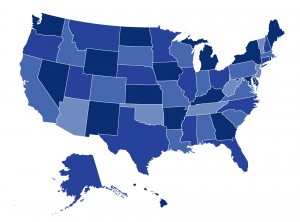Tag: affordable care act
States Revisit Essential Health Benefit Requirements, but Have Little Data on Consumers’ Experiences

Federal Affordable Care Act rules require the states to revisit the standard scope of benefits for individual and small business health plans – called essential health benefits or EHB – and determine whether revisions are needed. In a new blog post for the Commonwealth Fund, CHIR experts examine how the states approached this task, and what it might mean for consumers.
Wondering What Marketplace Rate Increases Mean for Consumers?

The third open enrollment season for the Affordable Care Act’s health insurance marketplaces begins on Sunday, November 1. The administration has released new data showing average health plan rate changes, with an average increase nationwide of 7.5 percent compared to 2015. Our colleague Tricia Brooks breaks down what these rate changes mean for consumers.
Who’s got the Best Crystal Ball? Estimates for 2016 ACA Enrollment
Half of the Uninsured are Eligible for ACA Coverage
Big Data and Baby Steps: Two Very Different Approaches to Data Collection

Most Americans see the need for more data about health insurance and how it’s working for consumers, and the insurance industry itself seems to recognize the importance of collecting and analyzing data. But it’s not clear that our government regulators do. JoAnn Volk looks at the mismatch between what insurers are undertaking and what federal rules will require for data collection.
Medicare Part D After Ten Years: Lessons for the Affordable Care Act
Why ACA Marketplaces Should Report Comprehensive Enrollment Data

The Affordable Care Act’s new health insurance marketplaces could be critical sources of data about how people access and use coverage. Yet, to date, the marketplaces have released varying degrees of information, with little uniformity or consensus over what data should be collected and how. In our latest post for The Commonwealth Fund, CHIR researchers Sean Miskell, Justin Giovannelli and Kevin Lucia examine data collection and reporting by the health insurance marketplaces.
The ACA Triggers Largest Decline in Uninsured since 1987: Now What?

U.S. Census data out last week shows that in 2014, the number of uninsured Americans declined by 8.8 million. As debates about the legitimacy and impact of the ACA fade in the rearview mirror, many policy experts are now shifting their attention to ways to improve the ACA for consumers. CHIR’s Hannah Ellison shares some ideas from a recent Urban Institute report.
More than 400,000 Lose Marketplace Coverage: Let’s Fix This and Keep People Covered

This week federal officials released an updated marketplace enrollment report. While close to 10 million were enrolled in coverage as of June 2015, 400,000 people lost coverage because of citizenship data matching problems. In this blog post our colleague at Georgetown’s Center for Children and Families, Sonya Schwartz, notes that many who lost coverage are likely eligible but fell victim to marketplace system problems. She shares insights on how they could be fixed.

